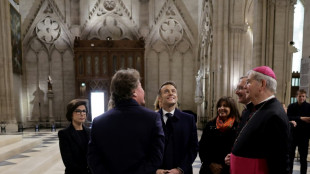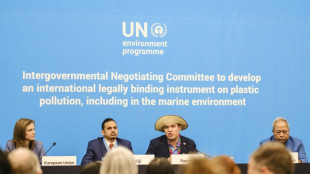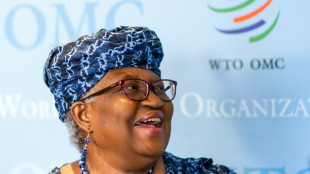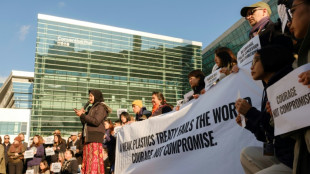
-
 Van Nistelrooy appointed Leicester manager
Van Nistelrooy appointed Leicester manager
-
Verstappen brought back to earth in Doha after F1 title party

-
 Global wine output to hit lowest level since 1961
Global wine output to hit lowest level since 1961
-
Norris boosts McLaren title hopes with sprint pole

-
 Big-hitting Stubbs takes satisfaction from grinding out Test century
Big-hitting Stubbs takes satisfaction from grinding out Test century
-
Romania recounts presidential ballots as parliamentary vote looms

-
 French skipper Dalin leads as Vendee Globe passes Cape of Good Hope
French skipper Dalin leads as Vendee Globe passes Cape of Good Hope
-
Chelsea not in Premier League title race, says Maresca

-
 Brazil's Bolsonaro aims to ride Trump wave back to office: WSJ
Brazil's Bolsonaro aims to ride Trump wave back to office: WSJ
-
France requests transfer of death row convict held in Indonesia: minister

-
 'Mamie Charge': Migrants find safe haven in Frenchwoman's garage
'Mamie Charge': Migrants find safe haven in Frenchwoman's garage
-
Iconic Uruguayan ex-leader hails country's swing left as 'farewell gift'

-
 Thousands rally in Georgia after violent police crackdown on pro-EU protesters
Thousands rally in Georgia after violent police crackdown on pro-EU protesters
-
Shared experiences make Murray 'perfect coach', says Djokovic

-
 Iran, Europeans to keep talking as tensions ratchet up
Iran, Europeans to keep talking as tensions ratchet up
-
Inflation-wary US consumers flock to 'Black Friday' deals

-
 France shows off restored Notre Dame after 'impossible' restoration
France shows off restored Notre Dame after 'impossible' restoration
-
South African bowlers strike after Sri Lanka set big target

-
 Namibia reopens polls after election chaos in ruling party test
Namibia reopens polls after election chaos in ruling party test
-
Georgia police arrest dozens in clashes with pro-EU protesters

-
 US stocks rise on Black Friday
US stocks rise on Black Friday
-
Leclerc on top for Ferrari in Qatar GP practice

-
 Jihadists, allies enter Syria's second city in lightning assault
Jihadists, allies enter Syria's second city in lightning assault
-
Amorim puts faith in Mount to turn around Man Utd career

-
 Guardiola will not 'run' from Man City rebuild
Guardiola will not 'run' from Man City rebuild
-
Assisted dying campaigners, opponents rally at UK parliament

-
 Durable prop Healy set to carve name in Irish rugby history
Durable prop Healy set to carve name in Irish rugby history
-
Macron unveils Notre Dame after 'impossible' restoration

-
 Traumatised Spain marks one month since catastrophic floods
Traumatised Spain marks one month since catastrophic floods
-
Yen rallies, euro up on rising inflation data

-
 Attack-minded Spurs boss Postecoglou says: 'You'll miss me when I'm gone'
Attack-minded Spurs boss Postecoglou says: 'You'll miss me when I'm gone'
-
Syria jihadists, allies shell major city Aleppo in shock offensive

-
 Macron inspects 'sublime' Notre Dame after reconstruction
Macron inspects 'sublime' Notre Dame after reconstruction
-
Arsenal must be near-perfect to catch Liverpool, says Arteta

-
 Arrests, intimidation stoke fear in Pakistan's politics
Arrests, intimidation stoke fear in Pakistan's politics
-
Showdown looms on plastic treaty days before deadline

-
 Ngozi Okonjo-Iweala: the WTO's trailblazing motivator
Ngozi Okonjo-Iweala: the WTO's trailblazing motivator
-
WTO chief reappointed as Trump threat looms

-
 US landmine offer to Ukraine throws treaty into 'crisis': campaign group
US landmine offer to Ukraine throws treaty into 'crisis': campaign group
-
British MPs debate contentious assisted dying law

-
 Macron offers first glimpse of post-fire Notre Dame
Macron offers first glimpse of post-fire Notre Dame
-
Syria jihadists, allies shell Aleppo in shock offensive

-
 Japan government approves $92 bn extra budget
Japan government approves $92 bn extra budget
-
Toll in Syria jihadist-army fighting rises to 242: monitor

-
 UK transport secretary quits in setback for Starmer
UK transport secretary quits in setback for Starmer
-
Days before deadline, plastic treaty draft highlights disagreement

-
 Crypto boss eats banana art he bought for $6.2 million
Crypto boss eats banana art he bought for $6.2 million
-
Teen news boss criticises Australian social media ban

-
 Taiwan detects 41 Chinese military aircraft, ships ahead of Lai US stopover
Taiwan detects 41 Chinese military aircraft, ships ahead of Lai US stopover
-
Spain urged to 'build differently' after deadly floods


Cubans to vote in referendum on same-sex marriage
Cubans on Sunday will vote in a landmark referendum on whether to legalize same-sex marriage and adoption, allow surrogate pregnancies and give greater rights to non-biological parents.
The new family code, promoted by the communist government, would represent a major shift in Cuba, where the culture of machismo is strong and where the LGBTQ community was ostracized by authorities in the 1960s and 1970s.
More than eight million Cubans over 16 are invited to vote "Yes" or "No" amid the country's worst economic crisis in 30 years, and experts say the referendum could turn into an opportunity to voice opposition against the government.
If approved, the new family code would replace a law in effect since 1975 and define marriage as the union between two people, rather than that of a man and a woman.
It would also permit surrogate pregnancies, as long as no money changes hands, while boosting children's rights and those of the elderly and people with disabilities.
"The family code sets out above all respect for human beings, respect for each (person) and everyone," said President Miguel Diaz-Canel.
Polling stations will be open from 7:00 am to 6:00 pm local time.
- 'I'm Christian, I have other ideas'-
The official attitude toward homosexuality has changed significantly over the past 20 years, and the government has put much effort into the "Yes" campaign on television and social media.
"I couldn't care less if two men marry or two women marry, I don't have that prejudice," 67-year-old retiree Reinaldo Orgalles told AFP. "I'm from another era, but I don't have that prejudice."
In 2019, the government sought to include same-sex marriage rights in the country's new constitution but balked after criticism from the Catholic and Evangelical Churches.
The Conference of Bishops recently reiterated its opposition to some of the key provisions of the new code, such as allowing surrogate pregnancies.
"It is unethical... when a woman who has carried a baby in her womb for nine months must hand it over to others straight after birth," the bishops said.
Zulika Corso, 65, a teacher in central Havana agrees.
"I'm Christian, I have other ideas, I don't accept this," she said.
- 'More important subjects' -
Between February and April, a vast public debate took place across Cuba, with more than 79,000 neighborhood meetings held to discuss the new family rights.
That resulted in more than half the original text being modified, according to official media.
Still, political scientist Rafael Hernandez calls it the "most important human rights legislation" in Cuba since the 1959 revolution.
The law would be one of the most progressive in Latin America, where same-sex marriage is only legal in eight other countries: Argentina, Brazil, Colombia, Ecuador, Costa Rica, Chile, Uruguay and some Mexican states.
But experts also say the sheer size of the code -- it contains some 500 articles -- could work against it.
Some Cubans, for example, have expressed support for same-sex marriage but oppose surrogate pregnancies.
"I still haven't decided because there are some things I consider good and many others I don't consider good," said Airam Zulueta, a restaurant owner.
Six decades after the revolution, Cuba is experiencing its worst economic crisis in 30 years, fueled by ramped-up US sanctions and a tourism collapse due to the coronavirus pandemic.
Many Cubans are struggling to access medicine, electricity, fuel and basic foodstuffs amid critical import shortages and staggering inflation.
The country erupted in historic anti-government protests last summer by citizens clamoring for food and greater freedoms.
Hundreds were detained and jailed, but crackdown has not stopped repeated demonstrations in recent months in a country notoriously intolerant of dissent.
Many voters could use this occasion to express disapproval of the government, experts have said.
"There are many other subjects that are more important than the family code, like the fact there is no food, that many people are hungry," concierge Julio Cesar Vazquez told AFP.
Dissidents and the banned opposition, short of other means to express themselves, have called on citizens to reject the new code or to abstain from voting.
The law needs more than 50 percent of the vote to be adopted.
O.Lorenz--BTB
